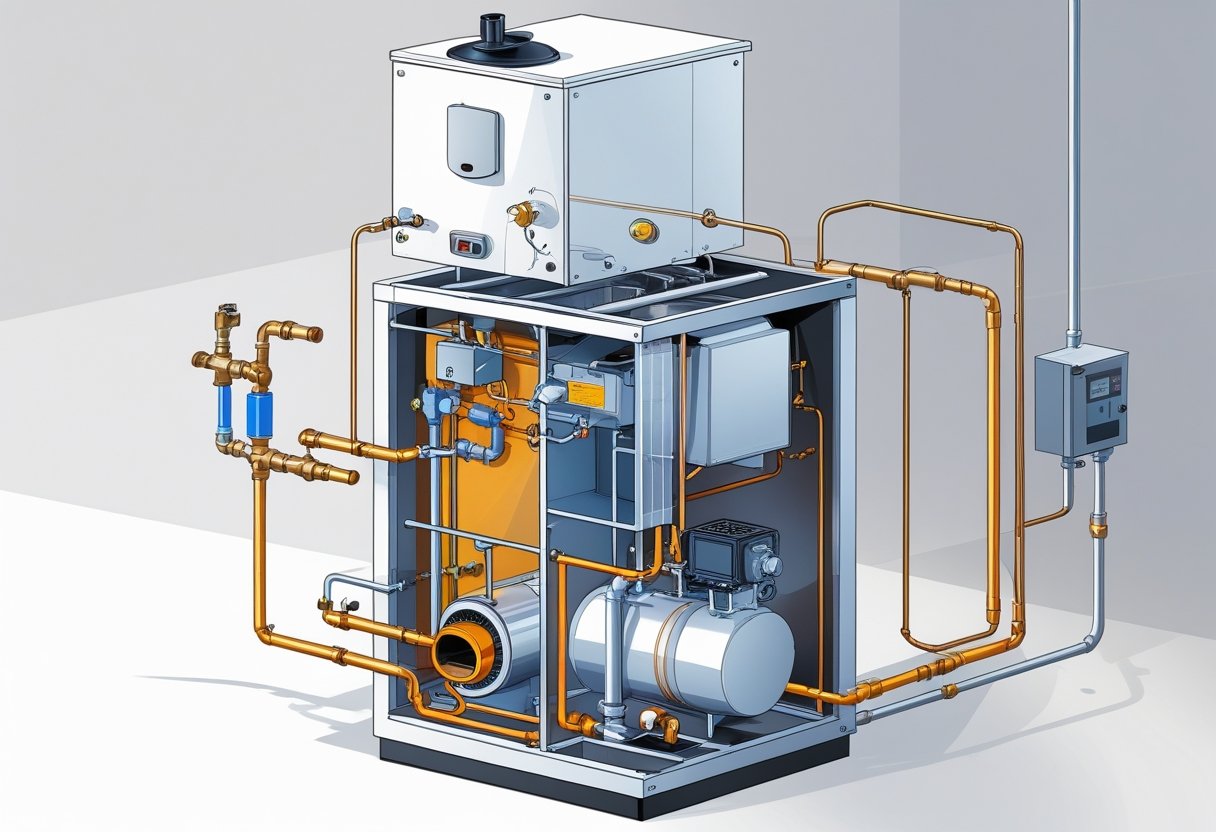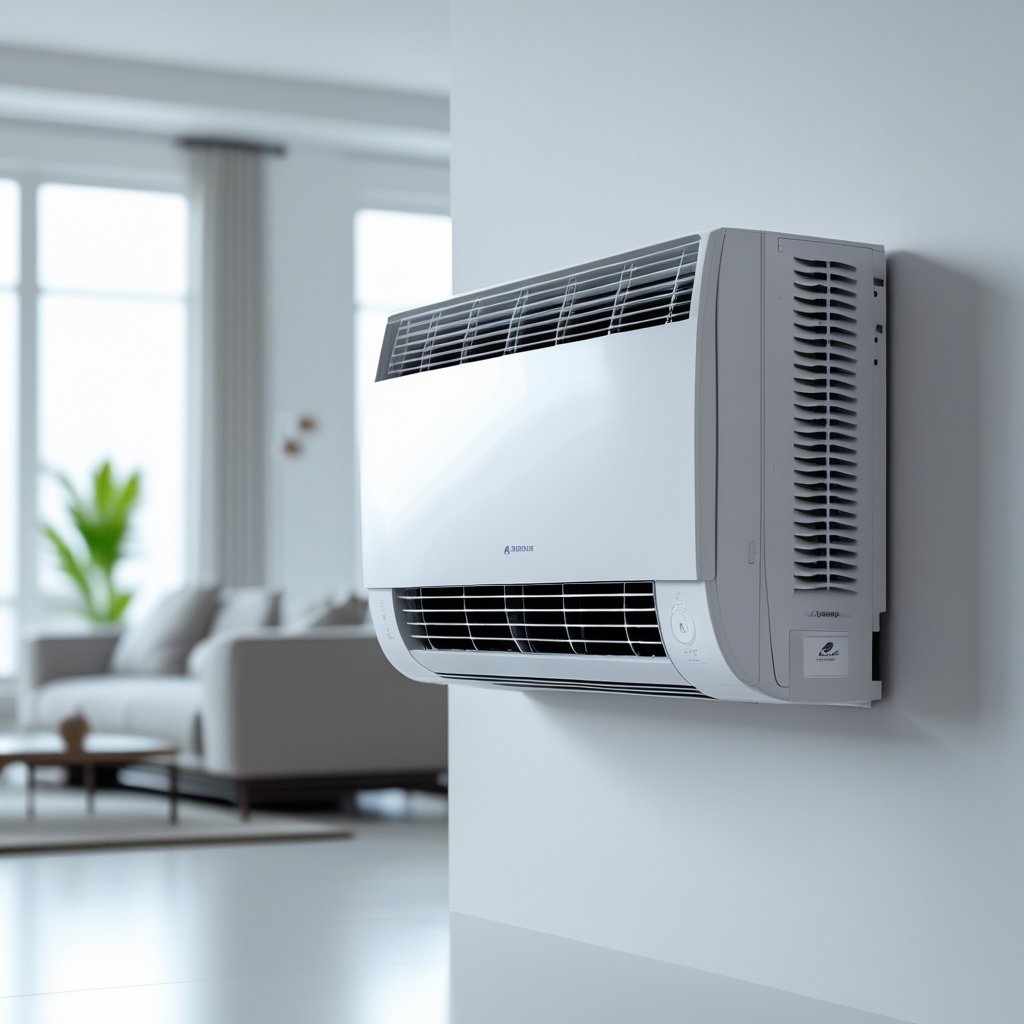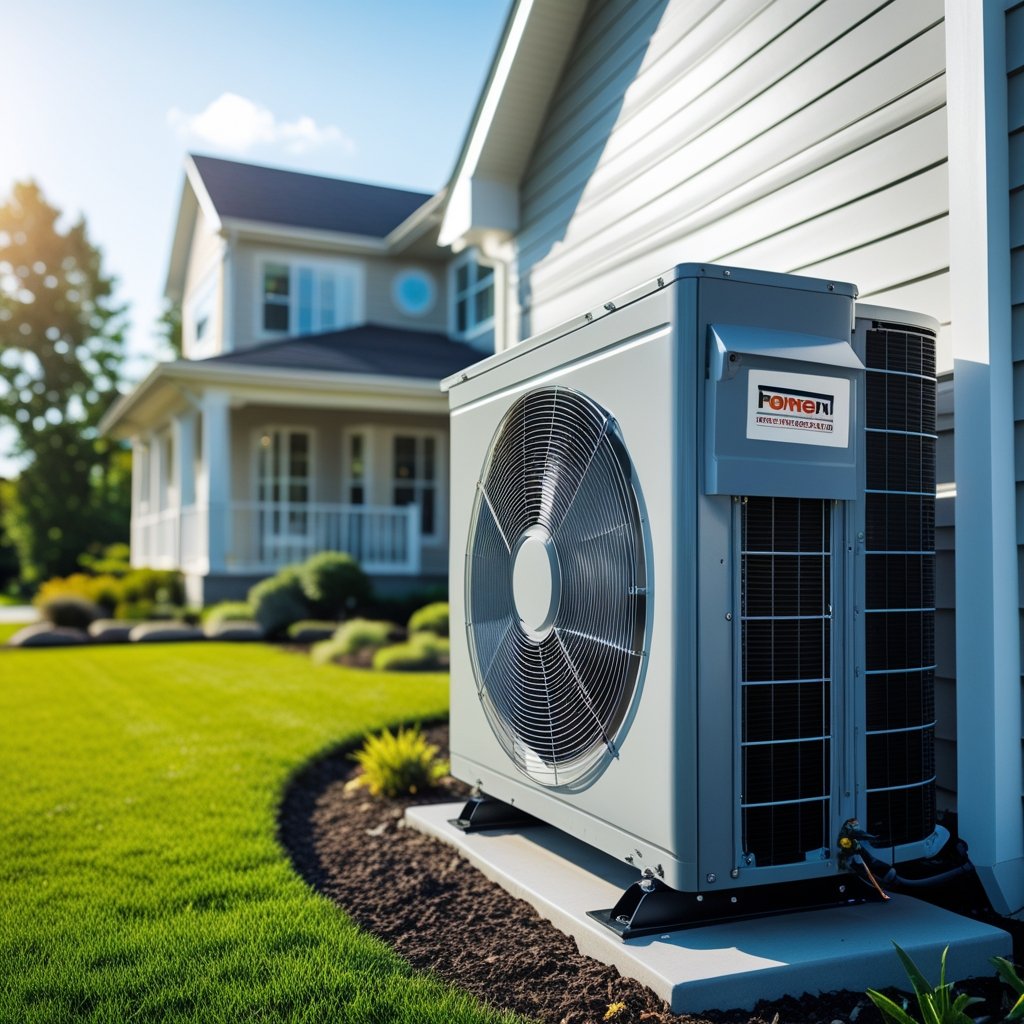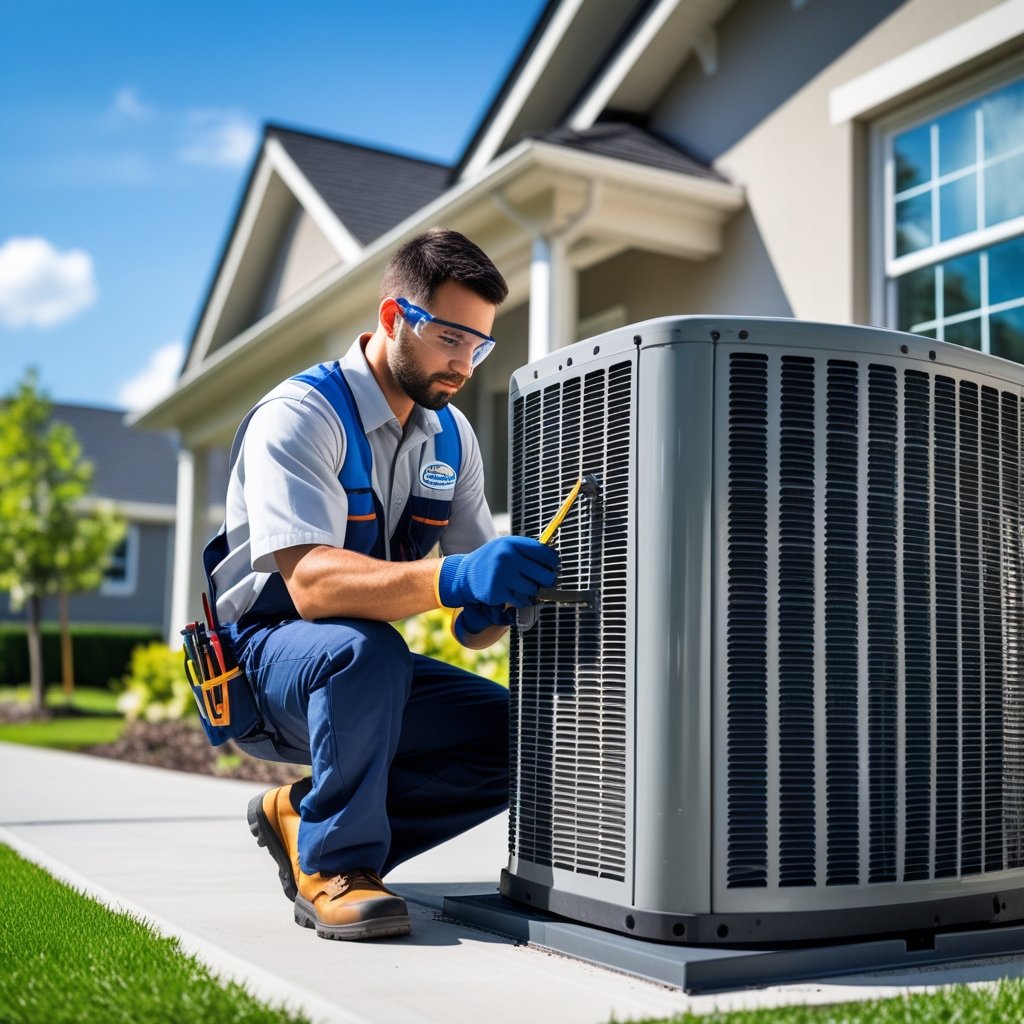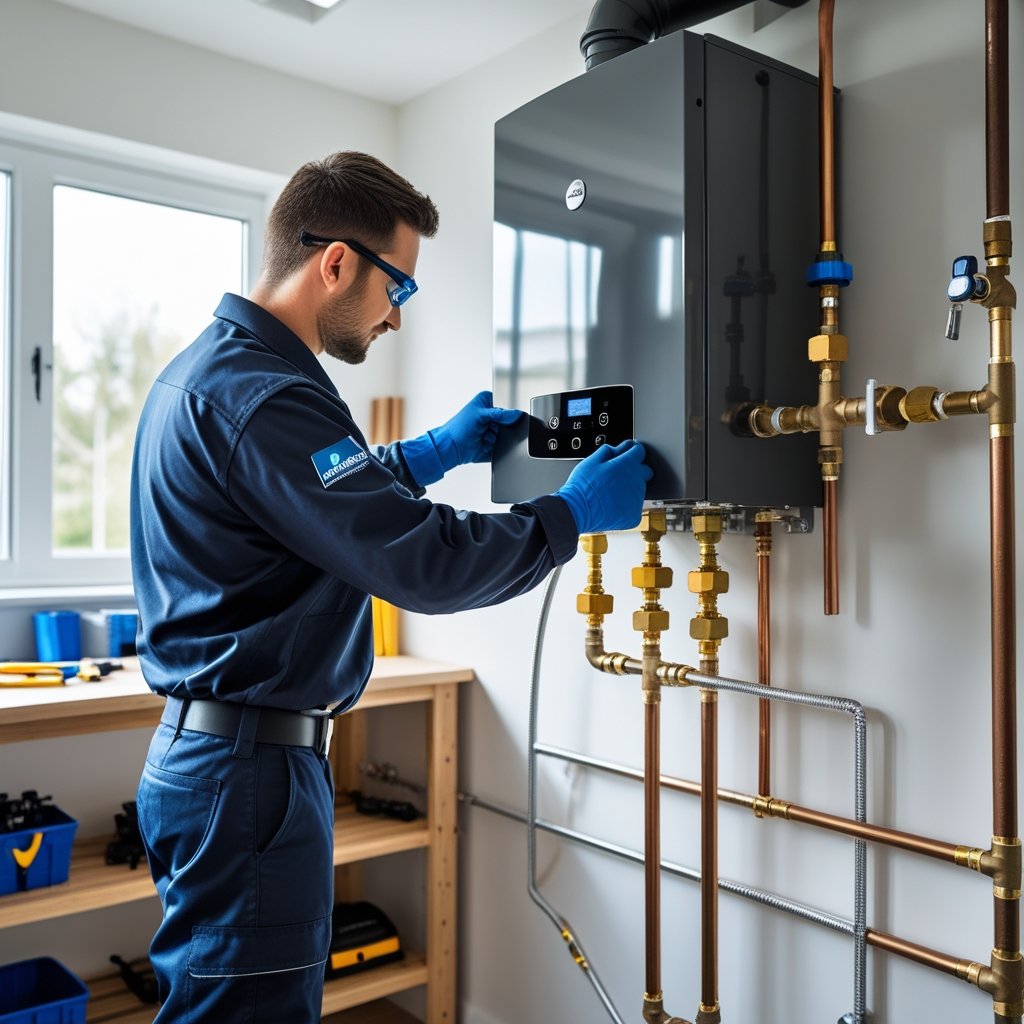A combi boiler, or combination boiler, is a popular option for homeowners seeking efficient heating and hot water solutions. This type of boiler provides heating for your home and delivers hot water directly from a single compact unit, eliminating the need for bulky storage tanks. Its space-saving design makes it ideal for smaller properties while offering the convenience of immediate hot water on demand.
By choosing a combi boiler, you can enjoy the benefits of energy efficiency and lower utility bills. Leo Kob Co. has been serving South Central Pennsylvania since 1904, ensuring that your household gets reliable plumbing and HVAC solutions tailored to your needs. Understanding what a combi boiler is and how it works can help you make informed decisions about your home’s heating system.
How Combi Boilers Work
Combi boilers operate as a compact heating and hot water system, providing instant hot water and efficient central heating. They eliminate the need for large storage tanks, making them ideal for homes with limited space. Understanding their functionality is crucial for maximizing efficiency and ensuring reliability.
Instant Hot Water and Heating Operation
Combi boilers are designed to provide instant hot water on demand. When you open a tap or turn on a shower, the boiler activates, heating the water directly from the mains supply. This means you don't have to wait for water to fill a tank.
The heating system works concurrently, efficiently circulating water throughout your home. This dual capability saves space and energy. As the boiler heats water only when needed, it minimizes wastage, promoting energy efficiency.
Newer models, like those available from Leo Kob Co., can reach efficiencies close to 98%. This high score means lower energy bills and an eco-friendly footprint, an increasingly important consideration for homeowners.
Primary Heat Exchanger Role
At the heart of a combi boiler is the primary heat exchanger, responsible for transferring heat from the combustion process to the water. When the boiler fires up, fuel burns and produces hot gases. These gases pass through the heat exchanger, warming the water and allowing it to flow to your taps.
The design of the heat exchanger is critical. Its efficiency plays a significant role in how effectively your boiler performs. A well-designed heat exchanger can significantly reduce fuel consumption while providing ample hot water. Regular maintenance is vital to ensure that the primary heat exchanger operates optimally, prolonging the life of your system.
Water Pressure and Mains Supply
Combi boilers rely on a consistent mains water supply to function effectively. The system requires adequate water pressure to deliver hot water throughout your home.
Water pressure can vary based on your location and the condition of your plumbing. If the mains supply pressure is too low, it may lead to insufficient hot water flow. Addressing pressure issues promptly is essential for maintaining comfort in your bathing and cooking routines.
Leo Kob Co. offers plumbing services to help you assess and improve your water pressure, ensuring your combi boiler system functions properly. Regular checks can help alleviate any potential issues before they escalate.
Types of Combi Boilers
Combi boilers come in several types that cater to different energy sources and homeowner needs. Understanding these types helps you choose the right system for your home and lifestyle.
Gas Combi Boilers
Gas combi boilers are among the most popular options due to their efficiency and versatility. They use natural gas to generate both heating and hot water on demand, eliminating the need for separate tanks. This compact design saves valuable space in your home.
With advanced condensing technology, gas combi boilers maximize energy efficiency by utilizing heat from the exhaust gases. They typically offer faster heating times compared to other types. Installation costs can vary, but many find that the operational savings justify the investment.
Leo Kob Co. recommends regular servicing to maintain efficiency and longevity. Proper maintenance ensures that your gas combi boiler operates safely and minimizes unexpected breakdowns.
Electric Combi Boilers
Electric combi boilers are ideal for homes without access to gas lines. These systems convert electricity directly into heat and provide immediate hot water. They are compact, making them suitable for smaller properties or apartments.
Despite being generally more expensive to operate than gas systems, electric combi boilers come with lower installation costs and do not require flue installations. They also tend to be quieter and more environmentally friendly when using renewable energy sources.
Regular maintenance is essential to keep the electric combi boiler running smoothly. This can include checking connections and ensuring the electrical system is up to code.
LPG Combi Boilers
LPG combi boilers serve as an alternative for homes in areas where natural gas is unavailable. They run on liquefied petroleum gas, which is efficient and offers similar performance to gas combi boilers.
These systems are often preferred in rural areas due to the portability of LPG tanks. They are compatible with condensing technology, which maximizes energy use and reduces emissions. Installation may require special considerations, including tank placement and venting.
For optimal performance, consider a service plan with Leo Kob Co. This ensures the LPG system functions efficiently and safely, addressing any issues before they become significant problems.
Oil Combi Boilers
Oil combi boilers are suitable for homes not connected to gas or electricity. They use heating oil as their primary energy source and can deliver hot water and heating effectively.
These systems typically require more space for fuel storage and may involve higher ongoing fuel costs. However, they can provide reliable heating for larger homes. Some models also incorporate condensing technology to improve efficiency.
Maintenance is critical for oil combi boilers, as regular inspections help ensure safety and efficiency. Leo Kob Co. provides tailored service plans to meet your specific heating needs while keeping your oil boiler in top condition.
Advantages of Combi Boilers
Combi boilers offer several benefits that make them an appealing choice for many homeowners. Their compact nature, energy efficiency, and ability to provide hot water on demand are significant advantages that can lead to lower energy bills and greater convenience in your daily routine.
Compact Design and Space Savings
One of the key advantages of a combi boiler is its compact design. Unlike traditional systems that require separate water tanks, a combi boiler combines heating and hot water functions in a single unit.
This space-saving feature is ideal for smaller homes where every square foot matters. You can conveniently install a combi boiler in locations like kitchens, utility rooms, or even lofts.
Such flexibility allows you to free up valuable space for other uses. If you’re looking for a cost-effective solution that doesn't compromise on performance, a combi boiler can be an attractive option.
Energy Efficiency and Lower Bills
Energy efficiency is another major benefit of combi boilers. These systems heat water directly from the mains. This means there’s no need to keep a large volume of water hot, leading to reduced energy use.
Homeowners often find that switching to a combi boiler can significantly lower their heating and hot water costs. Efficient operation helps minimize energy bills, making it easier to manage your household budget.
With the potential for lower energy costs, investing in a combi boiler can provide substantial long-term savings. If you want to make a smart choice for your energy bills, consider how a combi boiler can contribute.
Hot Water On Demand
A standout feature of combi boilers is their ability to provide hot water on demand. This means you won’t have to wait for a tank to fill up or heat water, as the system heats water only when needed.
This immediacy is particularly beneficial during peak usage times, such as when multiple family members require water simultaneously. So, you can run the shower while someone else washes dishes without worrying about running out of hot water.
With a combi boiler, you can enjoy consistent and reliable hot water without disruption. By choosing a system that meets your water demand effectively, you enhance your home’s comfort and convenience.
At Leo Kob Co., we understand the importance of these benefits and how they can improve your home heating and hot water solutions.
Disadvantages and Limitations
While combi boilers come with several advantages, they also feature notable disadvantages and limitations that you should consider when making a decision. Understanding these issues can help you better assess if this type of boiler fits your needs.
Water Flow Rate and Pressure Issues
One significant concern with combi boilers is their water flow rate and pressure. If multiple outlets demand hot water simultaneously, performance may falter. For example, if you're running a shower while using a kitchen tap, the water pressure could drop significantly. This can lead to inadequate hot water for appliances or reduced comfort during showers, especially if you have a power shower designed for higher water pressures.
Suitability for Larger Homes
Combi boilers might not be the best choice for larger homes with high hot water demand. In households where several people may use hot water at the same time—like during morning routines—this type of boiler can struggle to meet everyone's needs. If you have a big family or regularly host guests, you may find that a combi boiler does not provide sufficient hot water, making it less ideal compared to traditional systems with water storage.
Dependency on Mains Water
Another limitation of combi boilers is their dependency on mains water pressure. They require a steady, sufficient supply of water at the correct pressure to operate effectively. If your area suffers from low water pressure, particularly during peak usage times, the performance of your combi boiler could be compromised. You will need to check your local mains pressure before installation to ensure reliable operation and avoid potential issues with hot water availability.
For assistance in evaluating whether a combi boiler is the right fit for your home, consider reaching out to experts like Leo Kob Co. for a reliable assessment.
Combi Boilers vs Other Boiler Types
When evaluating heating options, it's essential to understand the differences between combi boilers and other types. This section will clarify how combi boilers compare to regular and system boilers, as well as conventional boilers.
Combi Boiler vs Regular Boiler
Regular boilers, or conventional boilers, consist of multiple components, including a cold water tank, a hot water cylinder, and a heating system. This setup is capable of supplying hot water to multiple outlets simultaneously. In contrast, a combi boiler heats water on demand, eliminating the need for tanks.
The absence of a hot water cylinder in combi boilers means they take up less space and can be installed in smaller homes. Conversely, regular boilers can be more efficient for larger households with high hot water demands, as they can store hot water for later use. If you're considering a transition, Leo Kob Co. can assess your needs for the most suitable system.
Combi Boiler vs System Boiler
System boilers also utilize a hot water cylinder but do not require a cold water tank, making them less bulky than regular boilers. They work well in homes with higher demands for hot water and provide a more consistent supply compared to combi boilers.
While both system and combi boilers offer central heating, a system boiler can store hot water for immediate use. This can be particularly helpful for larger families or homes with multiple bathrooms. In contrast, combi boilers heat water as needed, making them ideal for smaller households or apartments where space is a concern.
Comparison With Conventional Boilers
The term "conventional boiler" often refers to a regular boiler setup. Conventional systems involve larger components, which can occupy significant space and be more complex to install. They typically require a vast network of pipes, tanks, and immersion heaters.
Combi boilers are simpler, needing fewer components and making installation faster and more straightforward. This can translate into lower installation costs. While conventional boilers might provide a steady hot water supply, their size and complexity can be a disadvantage in smaller homes. If you're exploring options, consulting with a trusted service provider like Leo Kob Co. can help clarify your choices based on your home's specific needs.
Installation and Maintenance Considerations
When planning the installation of a combi boiler, several key factors come into play, including associated costs and choosing the right model. Additionally, understanding maintenance requirements is crucial for longevity and efficiency.
Installation Costs and Time
The installation cost of a combi boiler can range from $3,000 to $6,000, depending on several variables. These include the unit's brand, model, and the complexity of the installation process. Generally, expect the installation to take between one to three days, depending on your home’s existing heating infrastructure.
A qualified heating engineer is essential for this task. They will evaluate your central heating pipes, gas supply setup, and the flue system to ensure a safe installation. Obtaining an online quote can provide a clearer picture of costs tailored to your specific needs.
Choosing the Best Combi Boiler
Selecting the best combi boiler requires considering factors such as size, energy efficiency, and reliability. You need a unit that matches your home’s demand for hot water and heating. Some reputable brands provide excellent warranties and customer service.
Look for models with high energy efficiency ratings, as they lead to long-term savings on energy bills. Reading customer reviews can also help identify models that perform well in real-life situations. Leo Kob Co. can guide you in selecting the most suitable unit for your needs.
Maintenance and Service Requirements
Regular maintenance is key to maximizing your combi boiler's lifespan and efficiency. Schedule annual checks with a Gas Safe registered engineer to keep the unit operating smoothly. These professionals will inspect and tune your boiler, ensuring safety and performance.
Basic maintenance you can perform includes checking pressure levels, bleeding radiators, and inspecting for leaks. Many homeowners opt for maintenance plans that offer peace of mind with priority scheduling and discounts on repairs. This approach helps prevent costly breakdowns and extends the operational life of your system.
Frequently Asked Questions
This section addresses common inquiries regarding combi boilers. The information will help you understand their functionality, advantages, and installation considerations.
What are the pros and cons of installing a combi boiler?
Combi boilers have several advantages. They save space, as they combine heating and hot water in one unit. Installation is often simpler and faster compared to traditional systems.
On the other hand, hot water supply can be limited during peak demand, especially in larger households. Additionally, if you experience low water pressure, it can affect performance.
Can you illustrate how a combi boiler functions?
A combi boiler operates by heating water directly from the mains supply. When you turn on a hot water tap, cold water flows into the boiler, where it is rapidly heated and delivered to the tap. This setup eliminates the need for bulky storage tanks.
Is a combi boiler operated by gas, electricity, or both?
Combi boilers can operate using gas or electricity, depending on the specific model. Most commonly, gas combi boilers are favored for their efficiency and cost-effectiveness. Electric models are also available, offering flexibility for homes without gas supply.
How can I identify whether my home utilizes a combi boiler system?
You can check your existing boiler and plumbing setup. If you don't see separate hot water tanks or storage cylinders, you likely have a combi boiler.
Additionally, you may look for a unit that provides instant hot water without waiting for a tank to fill.
Are combi boilers more cost-effective compared to traditional boilers?
Combi boilers can be more cost-effective in terms of installation and energy efficiency. Since they do not require additional tanks, installation costs are lower.
Moreover, they typically have higher energy efficiency ratings, leading to savings on energy bills.
What distinguishes a combi boiler from a conventional boiler?
The main difference lies in their design and functionality. A combi boiler combines heating and hot water in one unit, while a conventional boiler requires separate tanks for hot water.
This distinction makes combi boilers more compact and easier to install in smaller spaces, appealing to many homeowners.
For further assistance with your heating needs, consider contacting Leo Kob Co. to discuss installation and maintenance options for combi boilers.

